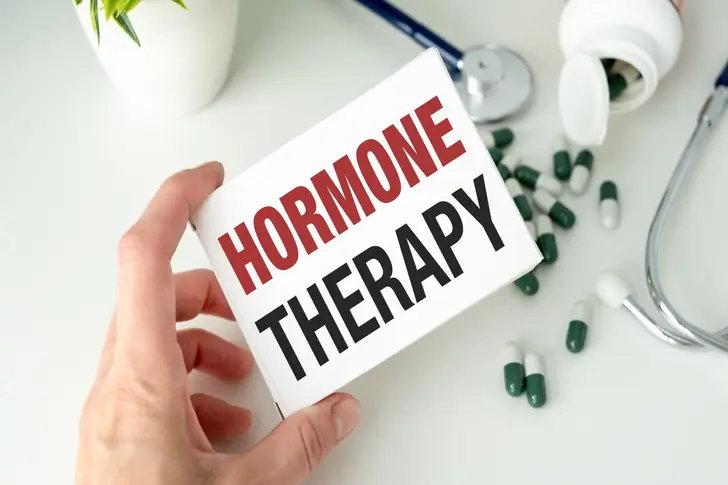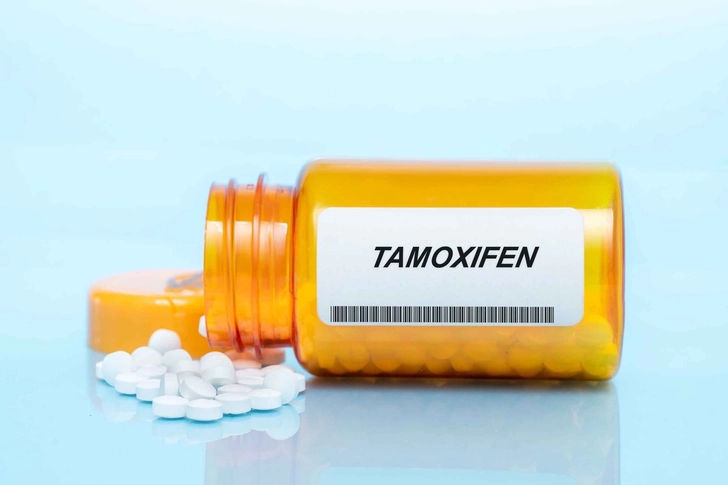- Overview
- Symptoms
- Risks, Prevention & Screening
- Tests & Diagnosis
- Types
- Your Breast Cancer Care Team
- Treatment
- Living With Breast Cancer
- Remission & Recurrence
- Advanced Breast Cancer
- Support & Resources
- Appointment Prep
- View Full Guide
Hormone Therapy for Breast Cancer


Hormone Therapy for Breast Cancer
Hormone therapy works by lowering the amount of estrogen in your body or blocking estrogen's effects on breast cancer cells. This therapy is typically used for hormone receptor-positive breast cancers, which make up about 2 out of every 3 breast cancers. Your doctor may recommend hormone therapy before or after surgery or as a standalone treatment, depending on your situation.

Types of Hormone Therapy
There are several types of hormone therapy available for breast cancer treatment. These include selective estrogen receptor modulators (SERMs) like tamoxifen, aromatase inhibitors (AIs) such as anastrozole, and estrogen receptor downregulators (ERDs) like fulvestrant. Each type works differently to either lower estrogen levels or block the effects of estrogen. Your doctor will help you choose the most appropriate option based on factors like whether you have gone through menopause and the characteristics of your cancer.

Benefits of Hormone Therapy
Hormone therapy can be highly effective in treating breast cancer. For early-stage breast cancer, it can lower the risk of the cancer coming back. In cases of advanced breast cancer, hormone therapy can shrink or slow the growth of tumors. It's often used as a long-term treatment, for at least five years, to provide ongoing protection against cancer coming back.

Hormone Therapy Side Effects
Common side effects of hormone therapy include hot flashes, night sweats, and vaginal dryness. Some women experience mood swings, fatigue, or joint pain. Long-term use of certain therapies may increase the risk of osteoporosis. Talk to your doctor about ways to manage any side effects.

Hormone Therapy and Menopause
Premenopausal women often receive tamoxifen, which can be used regardless of whether you've gone through menopause. Postmenopausal women typically start with an aromatase inhibitor. If you're close to menopause, your doctor might recommend waiting until you've completed menopause before starting certain therapies.

How Long Should Hormone Therapy Last?
Typically, treatment lasts for five to 10 years. Some women may benefit from therapy beyond five years, especially those at higher risk of having the cancer return. Your doctor will consider factors like the stage of your cancer, your overall health, and how well you're tolerating the treatment when deciding how long to continue therapy. Regular checkups will help monitor your progress and adjust the treatment plan if needed.

Combining Therapies
Hormone therapy is often used in combination with other treatments. It may be given before surgery to shrink tumors or after surgery to reduce the risk of recurrence. In some cases, it's combined with targeted therapies like CDK4/6 inhibitors for advanced breast cancer. Your treatment plan will be tailored to your specific situation, considering factors like cancer stage, tumor characteristics, and your overall health.
PHOTO CREDENTIALS
Slide 1 - Inna Kot/Shutterstock
Slide 2 - luchschenF/Shutterstock
Slide 3 - Peakstock/Shutterstock
Slide 4 - New Africa/Shutterstock
Slide 5 - Lordn/Shutterstock
Slide 6 - Ground Picture/Shutterstock
Slide 7 - PeopleImages.com - Yuri A/Shutterstock
SOURCES:
National Cancer Institute.
Breastcancer.org.
Medscape.
Pfizer Inc.
Burstein HJ, Lacchetti C, Anderson H, Buchholz TA, Davidson NE, Gelmon KA et al. Adjuvant Endocrine Therapy for Women With Hormone Receptor-Positive Breast Cancer: ASCO Clinical Practice Guideline Focused Update. J Clin Oncol. 2019 Feb 10;37(5):423-438.
Burstein HJ, Lacchetti C, Anderson H, Buchholz TA, Davidson NE, Gelmon KA et al. Adjuvant Endocrine Therapy for Women With Hormone Receptor-Positive Breast Cancer: American Society of Clinical Oncology Clinical Practice Guideline Update on Ovarian Suppression. J Clin Oncol. 2016;34(14):1689-1701.
Conzen SD and Henry NL. Managing the side effects of tamoxifen and aromatase inhibitors. In Vora SR, ed. UpToDate. Waltham, Mass.: UpToDate, 2021.
Davies C, Pan H, Godwin J, et al. Long-term effects of continuing adjuvant tamoxifen to 10 years versus stopping at 5 years after diagnosis of oestrogen receptor-positive breast cancer: ATLAS, a randomised trial. Lancet. 2013;381:805-816. Erratum in: Lancet. 2013 Mar 9;381(9869):804.
Gray RG, Rea D, Handley K, et al. Long-term effects of continuing adjuvant tamoxifen to 10 years versus stopping at 5 years in 6,953 women with early breast cancer. J Clin Oncol (Meeting Abstracts) June 2013 vol. 31 no. 18_suppl 5.
Henry NL, Shah PD, Haider I, Freer PE, Jagsi R, Sabel MS. Chapter 88: Cancer of the Breast. In: Niederhuber JE, Armitage JO, Doroshow JH, Kastan MB, Tepper JE, eds. Abeloff’s Clinical Oncology. 6th ed. Philadelphia, Pa: Elsevier; 2020.
Jagsi R, King TA, Lehman C, Morrow M, Harris JR, Burstein HJ. Chapter 79: Malignant Tumors of the Breast. In: DeVita VT, Lawrence TS, Lawrence TS, Rosenberg SA, eds. DeVita, Hellman, and Rosenberg’s Cancer: Principles and Practice of Oncology. 11th ed. Philadelphia, Pa: Lippincott Williams & Wilkins; 2019.
Ma CX and Sparano JA. Treatment approach to metastatic hormone receptor-positive, HER2-negative breast cancer: Endocrine therapy and targeted agents. In Vora SR, ed. UpToDate. Waltham, Mass.: UpToDate, 2021.
National Cancer Institute. Physician Data Query (PDQ). Breast Cancer Treatment – Health Professional Version. 2021.
National Comprehensive Cancer Network (NCCN). Practice Guidelines in Oncology: Breast Cancer. Version 6.2021.
Osborne CK. Chapter 53: Adjuvant Systemic Therapy Treatment Guidelines. In: Harris JR, Lippman ME, Morrow M, Osborne CK, eds. Diseases of the Breast. 5th ed. Philadelphia: Wolters Kluwer Health; 2014.
Rimawi MF and Osborne CK. Chapter 43: Adjuvant Systemic Therapy: Endocrine Therapy. In: Harris JR, Lippman ME, Morrow M, Osborne CK, eds. Diseases of the Breast. 5th ed. Philadelphia: Wolters Kluwer Health; 2014.
Rocca A, Maltoni R, Bravaccini S, Donati C, Andreis D. Clinical utility of fulvestrant in the treatment of breast cancer: a report on the emerging clinical evidence. Cancer Manag Res. 2018;10:3083–3099.
Stearns V and Davidson NE. Chapter 45: Adjuvant Chemo Endocrine Therapy. In: Harris JR, Lippman ME, Morrow M, Osborne CK, eds. Diseases of the Breast. 5th ed. Philadelphia: Wolters Kluwer Health; 2014.